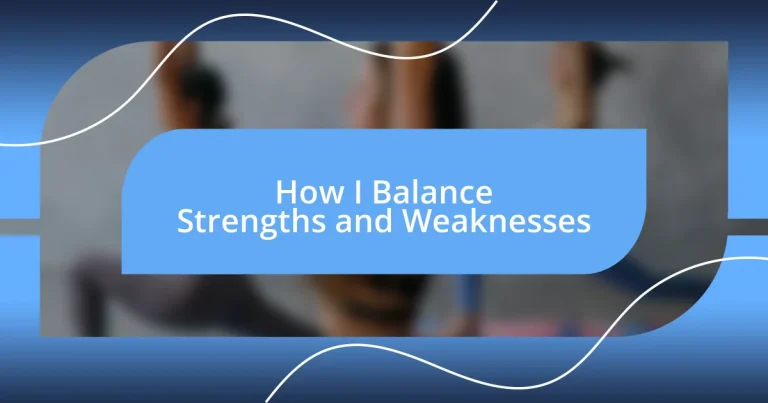Key takeaways:
- Understanding personal strengths enhances self-awareness and fosters deeper relationships, allowing individuals to leverage their abilities in daily life.
- Identifying personal weaknesses is essential for growth; acknowledging shortcomings can transform difficulties into opportunities for improvement.
- Creating and monitoring an action plan promotes accountability and reflection, helping individuals adapt their strategies and celebrate both achievements and lessons learned.
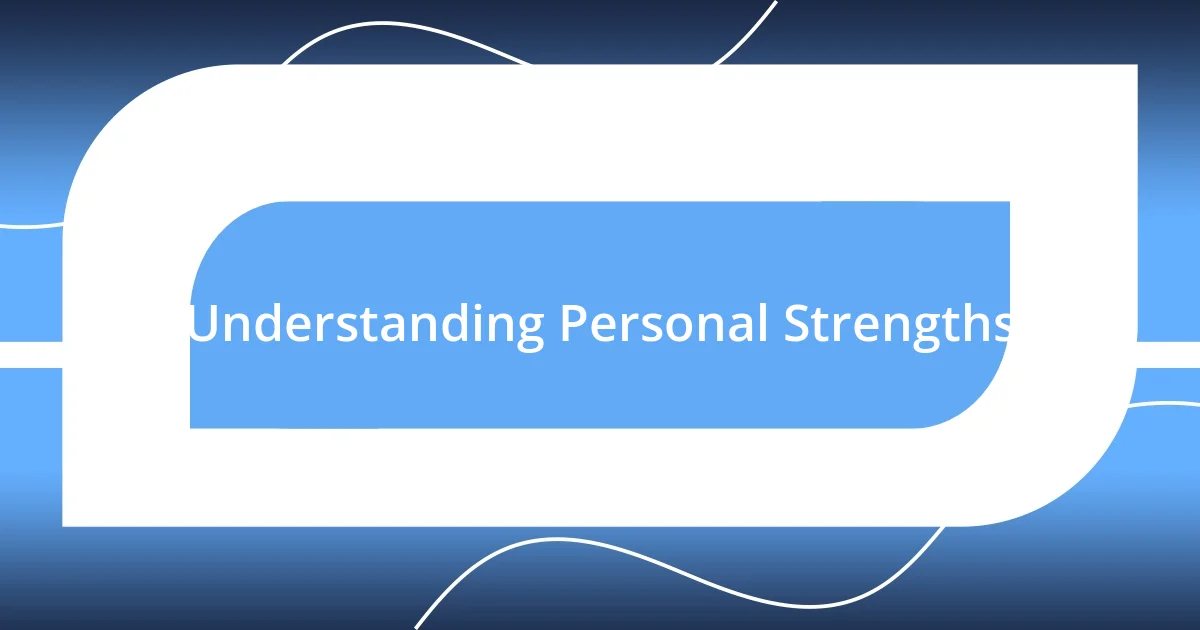
Understanding Personal Strengths
Understanding our personal strengths is a crucial step toward self-awareness. I still remember when I took a strengths assessment for the first time. It revealed my knack for empathy and communication, which was such a relief! I realized these qualities have always helped me connect deeply with others.
Sometimes, I reflect on how these strengths have shaped my relationships. Have you ever noticed how your strengths surface in different situations? For me, being able to listen and validate others’ feelings has not only deepened friendships but also created bonds that withstand the test of time. It feels rewarding to know that I can make a difference just by being myself.
Recognizing strengths goes beyond identifying what I excel at; it’s about understanding how to leverage them in my daily life. I often ask myself whether I’m using my strengths to their fullest potential. I strive to find opportunities that allow me to showcase my abilities, whether in my career or personal life. Embracing my strengths has empowered me, transforming challenges into opportunities for growth.
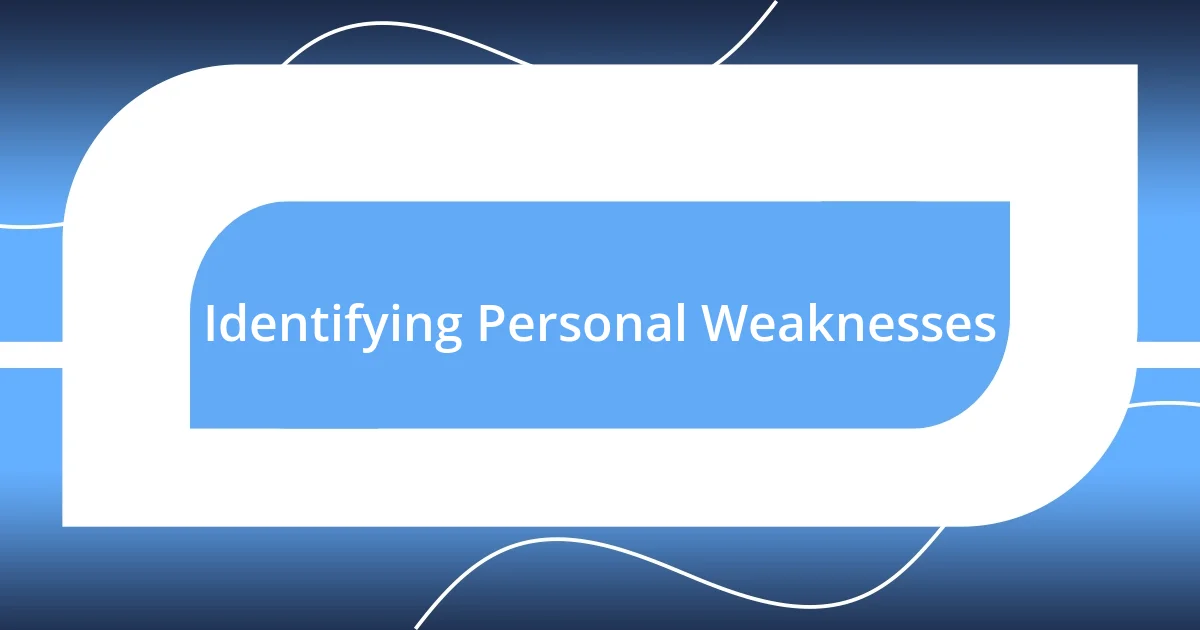
Identifying Personal Weaknesses
Identifying personal weaknesses isn’t always easy, but it’s essential for growth. I’ll admit, when I first started this process, it felt uncomfortable to face the areas where I didn’t shine. It was a bit like looking in a mirror and not always liking what I saw. Yet, once I got past that discomfort, I realized it was liberating to acknowledge my shortcomings. I started keeping a journal where I honestly wrote down instances where I struggled or felt out of my depth. This helped illuminate patterns.
Here are some common personal weaknesses I’ve identified and reflected upon over time:
- Procrastination: I often delay tasks, which affects my productivity and increases stress.
- Impatience: I struggle to wait for results, especially in collaborative projects where others work at a different pace.
- Overthinking: I have a tendency to analyze situations excessively, making it hard to make decisions.
- Poor time management: Balancing multiple commitments sometimes becomes a juggling act, leading to missed deadlines.
- Difficulty saying ‘no’: I often take on too much, which can overwhelm me and detract from my core responsibilities.
Recognizing these weaknesses has not only been eye-opening but also transformative, as it challenges me to improve and adapt rather than remain stagnant.
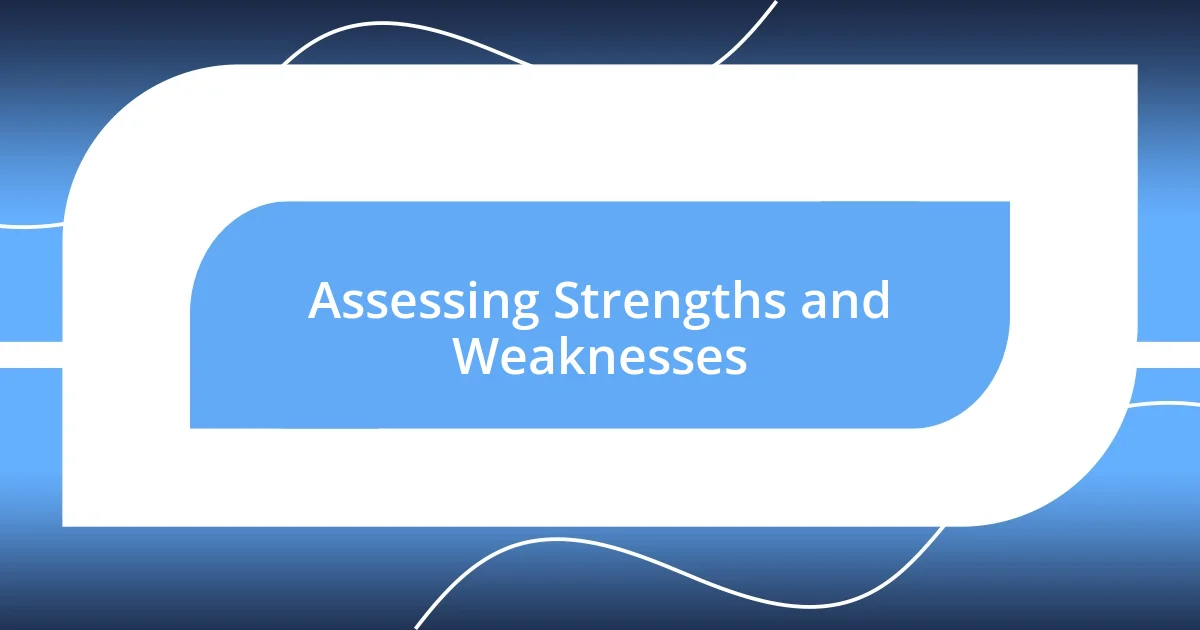
Assessing Strengths and Weaknesses
Assessing strengths and weaknesses involves an honest examination of oneself. I remember sitting down with a cup of coffee and reflecting on both sides of this spectrum. What really surprised me was how my weaknesses often masked my strengths. For example, my tendency to overthink sometimes hinders my decision-making, yet it can also lead to thorough solutions when I finally arrive at a conclusion.
To navigate this self-assessment journey, I recommend asking reflective questions. Are there situations where your weaknesses have hindered your strengths? For instance, I realized that my impatience has occasionally caused me to overlook the contributions of others who might take longer to process information. This self-awareness unveiled a deeper understanding of how to recognize the areas I can work on and improve relationships in the process.
Creating a tangible list of strengths and weaknesses can be a guiding tool. I often jot down specific examples from my life that highlight both my capabilities and areas for growth. This isn’t just about labeling; it’s an active way to visualize my progress. Here’s a simplified comparison of what I’ve noticed:
| Strengths | Weaknesses |
|---|---|
| Empathy | Procrastination |
| Effective communication | Impatience |
| Problem-solving skills | Overthinking |
| Adaptability | Poor time management |
| Creativity | Difficulty saying ‘no’ |
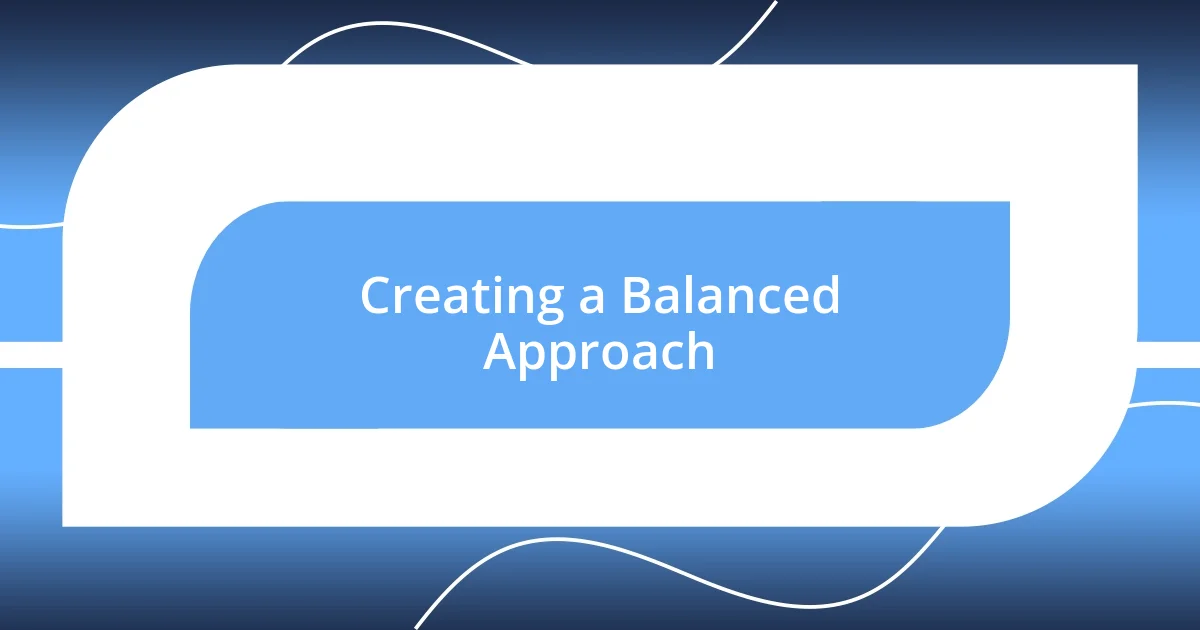
Creating a Balanced Approach
Creating a balanced approach involves recognizing the interplay between strengths and weaknesses. I remember a time when I was deep into a project, feeling overwhelmed by my procrastination. Then, I decided to flip the script. Instead of just viewing my tendency to delay as a flaw, I explored how I could harness that creativity and turn it into a strategy for brainstorming sessions. Have you ever considered how your weaknesses might actually spark innovative ideas?
When I focus on balancing my strengths with my weaknesses, it’s a genuine exercise in self-discovery. I often think about how my empathy, while a strength, can make me susceptible to overextending myself. During a recent team project, I caught myself wanting to help everyone while neglecting my own tasks. By recognizing this, I made a conscious effort to set boundaries and prioritize my responsibilities. Isn’t it fascinating how those moments of struggle can lead to valuable lessons about self-care?
The key is to be proactive in addressing this balance. I’ve learned that setting specific, measurable goals not only brings clarity to my progress but also reinforces my commitment to improvement. For instance, instead of simply stating that I want to manage my time better, I established a daily schedule with time blocks. This little change shifted my perspective and empowered me to take charge of my time. How do you manage your planning? Exploring these practices helps demystify the process and fosters a sense of accomplishment as we work on our growth.
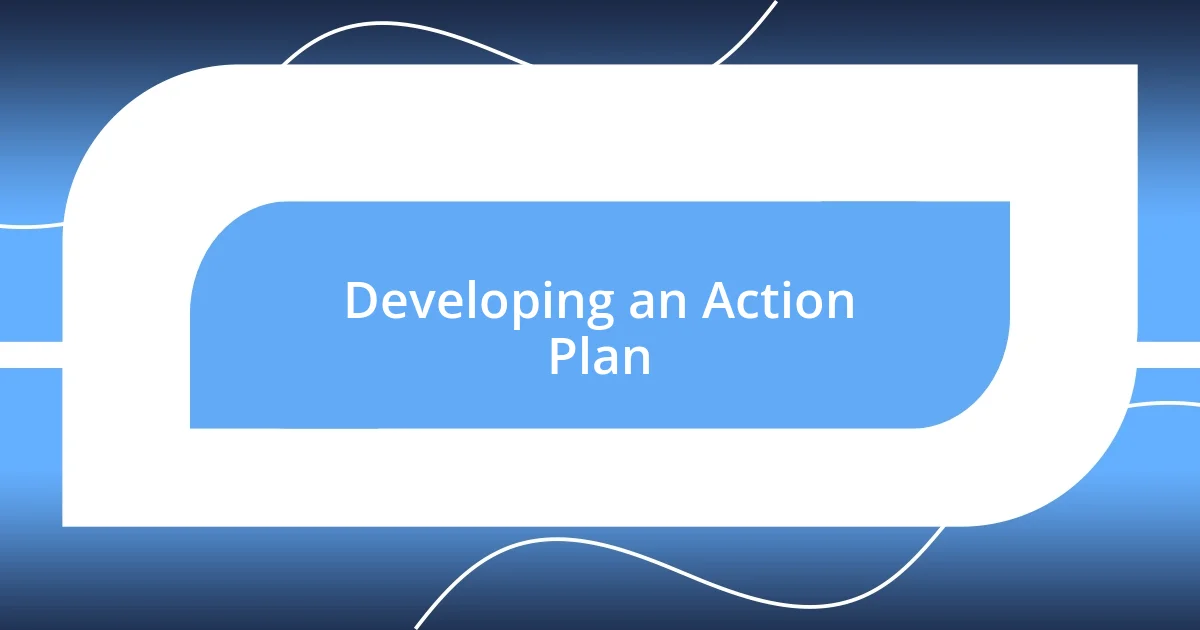
Developing an Action Plan
Developing an action plan is all about transforming self-awareness into concrete steps. I remember when I first crafted my plan; it felt like piecing together a jigsaw puzzle. By outlining specific targets, I began to see how tackling one weakness at a time made the process feel less overwhelming. Have you ever felt daunted by the idea of change? Breaking it down made it manageable for me.
To make my action plan effective, I emphasize the importance of accountability. I often share my goals with a close friend who journeys alongside me. This connection keeps me motivated and allows us to challenge one another in a supportive way. What about you? Do you have someone who can help you stay on track? Having that external support can make a significant difference in maintaining momentum.
Lastly, I find it crucial to celebrate small victories. When I achieved a minor goal, like improving my time management for just one week, I treated myself to a favorite coffee shop visit. It may seem trivial, but acknowledging progress fuels my motivation for the next challenge. How do you celebrate your accomplishments? Building upon those moments creates a positive reinforcement cycle that keeps me engaged in my growth journey.
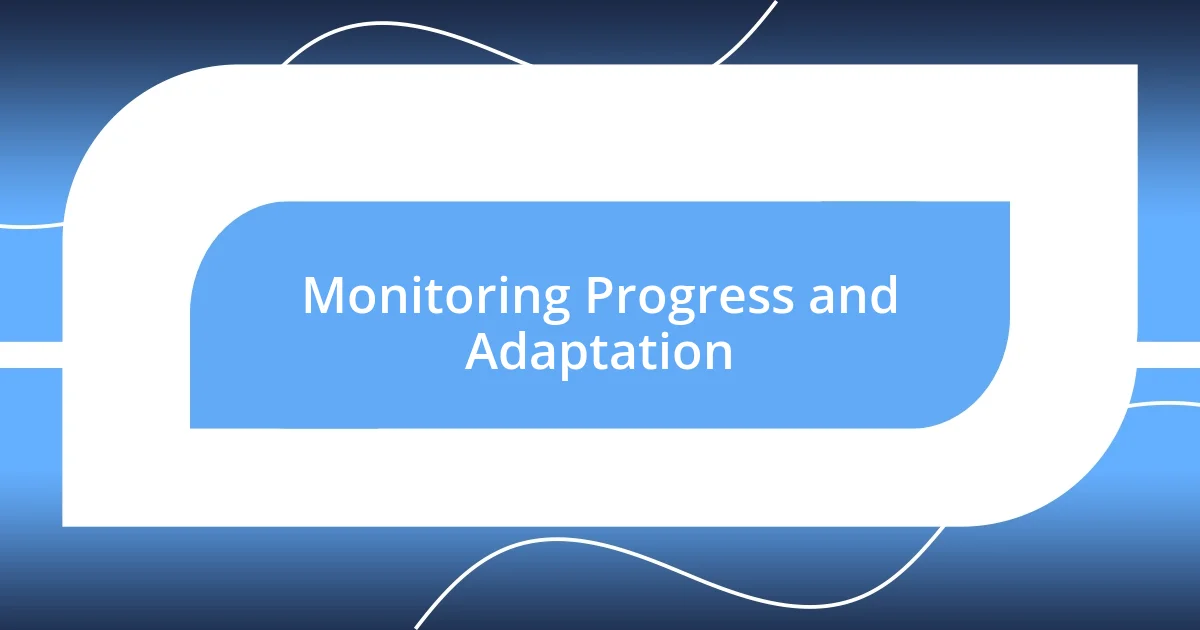
Monitoring Progress and Adaptation
Monitoring progress is essential for effective adaptation in any personal growth journey. I often track my progress using a journal, where I jot down not only my achievements but also my challenges. Have you ever taken a moment to reflect on what’s working and what isn’t? This simple practice has helped me identify patterns, allowing me to pivot my strategies when needed.
Adapting my approach is something I’ve become more comfortable with over time. For instance, I once dedicated three months to enhancing my public speaking skills. When I didn’t see the improvement I hoped for, I reassessed my methods. Instead of sticking to a rigid schedule, I incorporated more diverse practice sessions, such as joining a local Toastmasters group, which not only refined my technique but also boosted my confidence. It’s amazing how flexibility in our plans can lead to unexpected growth. Have you considered how a little adjustment might unlock your potential?
Throughout this process, I’ve learned the power of reflection. After each milestone, I take time to evaluate my experiences – what felt good and what didn’t resonate. This conscious reflection not only informs my future actions but also strengthens my commitment to my goals. How often do you check in with yourself? Embracing this habit has turned my journey into a dynamic cycle of learning, allowing me to grow in ways I never anticipated.
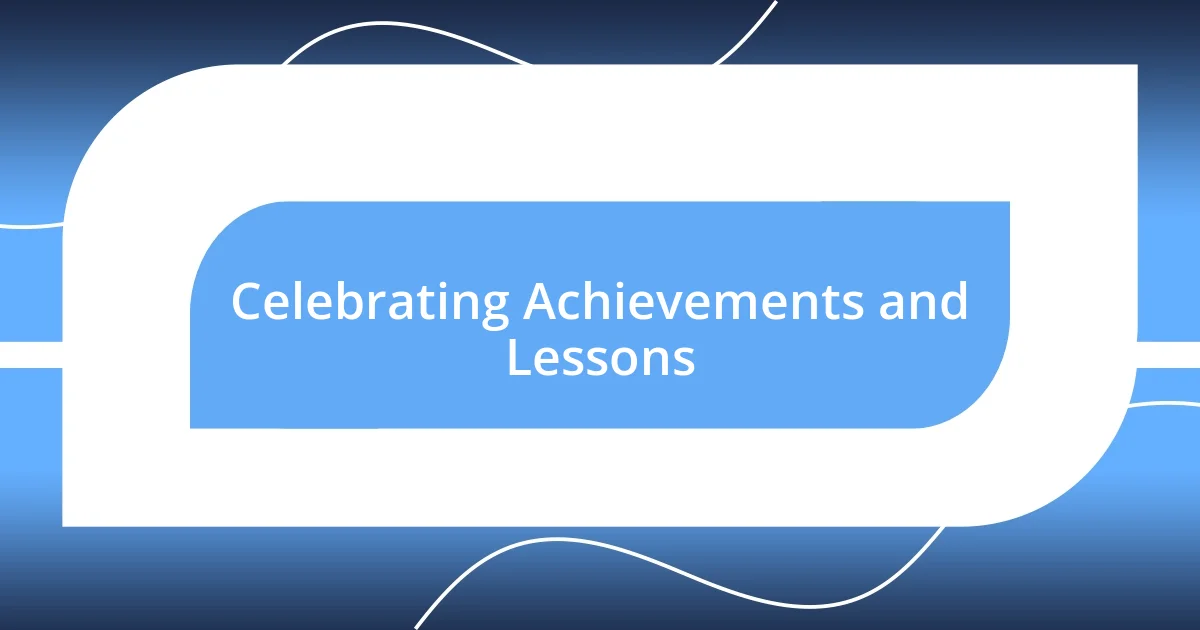
Celebrating Achievements and Lessons
Celebrating Achievements and Lessons
Reflecting on achievements can create a profound sense of joy and motivation. I distinctly remember the day I completed my first marathon. After months of training and overcoming countless self-doubts, crossing that finish line felt surreal. Have you ever felt an overwhelming sense of pride after reaching a long-sought goal? That moment reminded me that celebrating these milestones, no matter how big or small, fuels the passion for my next challenge.
Lessons, too, deserve recognition. Once, during a group project, I stumbled by not voicing my ideas, which ultimately affected our outcome. It was disheartening, but I learned something valuable: my voice matters. Acknowledging this lesson transformed my approach in future collaborations. Have you faced a bump in the road that taught you something transformative? Embracing those bumps can turn setbacks into stepping stones for growth.
In my journey, I’ve found that celebrating not just successes but also the lessons can create a richer narrative of self-discovery. For instance, after a challenging week of juggling responsibilities, I treat myself to a night of relaxation, reflecting on both my achievements and areas to improve. How do you celebrate your lessons? Prioritizing this balance keeps my mindset open and ready for whatever comes next.












